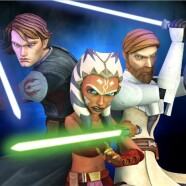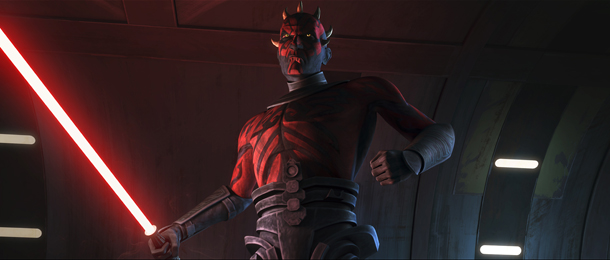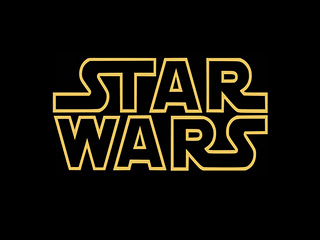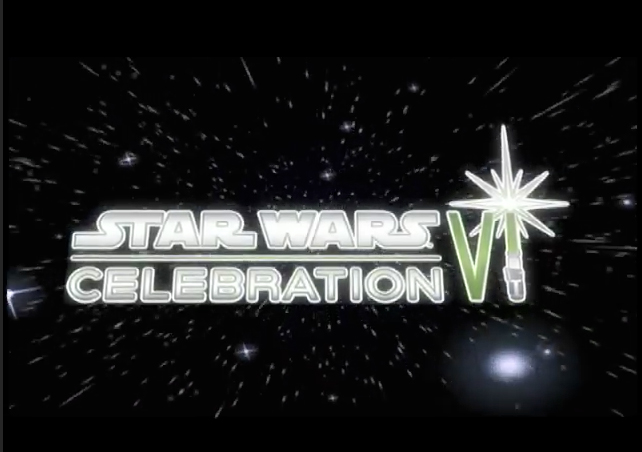Editorial: Closing the Gaps in the Star Wars Saga
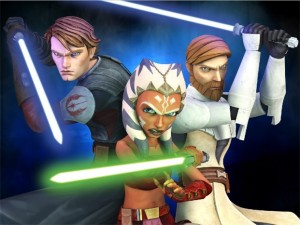 ***Warning: Spoiler Alert for those who haven’t yet seen the season 5 finale of Star Wars: The Clone Wars.***
***Warning: Spoiler Alert for those who haven’t yet seen the season 5 finale of Star Wars: The Clone Wars.***
I think I speak for the vast majority of Star Wars fans when I say I’m excited for Episode VII and the future of the franchise beyond that. That’s not what’s on my mind right now. Instead, I’m still working through the gaps in the saga as it’s presented to us at this point in time, specifically the bridge from the end of Attack of the Clones to the beginning of A New Hope. In other words, the eras known as the Clone Wars and the Dark Times.
As I do after every season finale of The Clone Wars, I went through yet another viewing of Revenge of the Sith. I feel compelled to do this every time so that I can get a truer sense of how well the story is filling in, to see what’s there vs. what I only think is there.  This time around, a great many subtleties are making more and more sense, especially between Anakin and Obi-Wan.  There are a lot of assumptions that I take for granted, but I don’t think I’ve truly stopped to appreciate the nuances in their characters until now.  The overreacting fanbase out there (I seem to attract these people in my real world travels) kept crying foul about every little point of characterization, and I kept saying “judge slowly – this is George’s M.O.” He’s proven to us in the past that just because we don’t see the whole picture, that doesn’t mean it isn’t there. Well, five seasons out, so much is fitting together so well that I hope those people I keep running into are beginning to see it.  I know I’m starting to see these little threads pull tighter and close up gaps in the larger tapestry, and the storyteller in me loves to see this journey that I’ve been following my whole life stitch itself together at long last. That’s why I’m pushing for more Clone Wars. That, and I just really enjoy the series on its own merits.
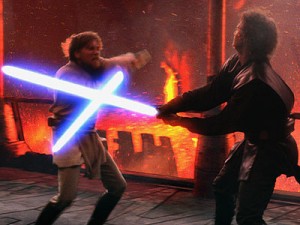 What I saw going into the confrontation on Mustafar is that Anakin had let himself believe the worst in Obi-Wan after sensing his presence at Padme’s apartments. Up to that point, the trust issues between Anakin and the Jedi Council ensured that the only reason Anakin hadn’t left at that point was because of Obi-Wan. Extrapolating that from the season finale of Clone Wars, it’s easy to see where Anakin would accept Obi-Wan’s explanation that the Council went against his recommendations.
What I saw going into the confrontation on Mustafar is that Anakin had let himself believe the worst in Obi-Wan after sensing his presence at Padme’s apartments. Up to that point, the trust issues between Anakin and the Jedi Council ensured that the only reason Anakin hadn’t left at that point was because of Obi-Wan. Extrapolating that from the season finale of Clone Wars, it’s easy to see where Anakin would accept Obi-Wan’s explanation that the Council went against his recommendations.
So why does Obi-Wan still sit on the Council? Two reasons. First, because Kenobi is something of a teacher’s pet, and because he has that mentality that he must do right by the Order, he’s letting his voice be heard in an attempt to bring reason to a situation that has clearly blinded the majority of the masters.  Second, his belief in Anakin as the Chosen One means that if he’s in the right place and keeps both the masters and Anakin in the right mindset, the prophecy will be fulfilled. After the events on Mortis (season 3), and in listening to his disbelief as Anakin burned up on Mustafar, you could tell that somewhere along the lines he had come to truly believe as Qui-Gon did in Anakin’s potential.
When Padme “betrayed” Anakin by bringing Obi-Wan along, that was a double-barreled “strike three” that allowed Anakin to lose all hope and blind himself to the truth. To recap, strike one is the death of his mother at the Tusken camp, and now strike two is Ahsoka leaving the Jedi Order. To his mindset on Mustafar, even his sacrifice on Padme’s behalf – all that death and carnage at the Temple – was for nothing. What was left but to embrace the path he had chosen and make everything right by taking over? It sounds ridiculous from an outsider perspective, but who hasn’t made a mistake and then compounded it by trying to fix it? From someone like Anakin, it just makes sense to his character to go full-out. So now the initial gripes we had in 2005 about “Anakin’s fall was just way too quick and unbelievable” really have been fleshed out to a far more acceptable point. Watching Ep. III again last night, this was the first time I’ve completely felt sold on his fall to the Dark Side.
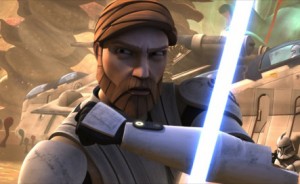 Going through season 4 and into season 5, I learned to really start to both admire and despise Obi-Wan’s less than Jedi-like ability to sneak around behind everyone’s back. Maybe James Arnold Taylor was a little too convincing in the role, but not only did I despise Kenobi at points, but I got to the point where I started believing that it was easy to tell when he was lying: his lips were moving. Not bad for a character who mistrusts politicians. There were times I truly started questioning if he was a Jedi Master, a politician himself, or a soldier, and ultimately I think that’s the entire point: to have that line crossed and irrevocably blurred. And if I felt this way as a viewer that I couldn’t necessarily trust Kenobi’s motives at all turns, what was going through the mind of the hyper-paranoid and self-persecuted Anakin? But after this last story arc, I started seeing the better side of Kenobi again that tied it all back to what I saw in Episodes III and IV. After Kenobi stepped in on Ahsoka’s behalf before her trial, for all the good it did, that he stood up for her dropped in the missing piece for me that helped me to begin to see a shadow of the wise old hermit I got to know back in 1977. His loyalty the Jedi Order isn’t some misguided trust in the Council as it might have been back in The Phantom Menace. It’s his trust in the Force and in the prophecy of the Chosen One. For all of his failings, double-dealings, and sleight-of-hand maneuvers within the framework of the Clone Wars, the man truly believes that Light will win out over Darkness so long as those who serve the Light continue to do so. Even after Mustafar, he was able to keep that hope alive because of Luke, but between Order 66 and the Dark Times that followed, his faith would be whittled down by Return of the Jedi when Luke announced that he couldn’t kill his father. In Obi-Wan’s eyes, Vader’s destruction was the only path that remained.  That it’s not for vengeance is telling of the man who would be a hero.
Going through season 4 and into season 5, I learned to really start to both admire and despise Obi-Wan’s less than Jedi-like ability to sneak around behind everyone’s back. Maybe James Arnold Taylor was a little too convincing in the role, but not only did I despise Kenobi at points, but I got to the point where I started believing that it was easy to tell when he was lying: his lips were moving. Not bad for a character who mistrusts politicians. There were times I truly started questioning if he was a Jedi Master, a politician himself, or a soldier, and ultimately I think that’s the entire point: to have that line crossed and irrevocably blurred. And if I felt this way as a viewer that I couldn’t necessarily trust Kenobi’s motives at all turns, what was going through the mind of the hyper-paranoid and self-persecuted Anakin? But after this last story arc, I started seeing the better side of Kenobi again that tied it all back to what I saw in Episodes III and IV. After Kenobi stepped in on Ahsoka’s behalf before her trial, for all the good it did, that he stood up for her dropped in the missing piece for me that helped me to begin to see a shadow of the wise old hermit I got to know back in 1977. His loyalty the Jedi Order isn’t some misguided trust in the Council as it might have been back in The Phantom Menace. It’s his trust in the Force and in the prophecy of the Chosen One. For all of his failings, double-dealings, and sleight-of-hand maneuvers within the framework of the Clone Wars, the man truly believes that Light will win out over Darkness so long as those who serve the Light continue to do so. Even after Mustafar, he was able to keep that hope alive because of Luke, but between Order 66 and the Dark Times that followed, his faith would be whittled down by Return of the Jedi when Luke announced that he couldn’t kill his father. In Obi-Wan’s eyes, Vader’s destruction was the only path that remained.  That it’s not for vengeance is telling of the man who would be a hero.
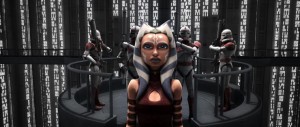 Regarding the Council’s “trial” of Ahsoka… I understand that Mace Windu had trust issues, and his lack of belief in Ahsoka was due to his lack of trust in the one who’d trained her. Kai Adi-Mundi and Plo Koon were pretty much just blindsided and no longer believed their guts for whatever reason. Yoda… I’m hurt and disappointed in him as the exemplar of everything the Jedi hold to be true. That said, I also get it. At long last, I get it.  George Lucas suggested that in Yoda’s younger days, it was he who had a critical hand in wiping out the last great Sith threat. He experienced what it took to defeat them, and that experience shaped him. Then combine that with the longer view of the Dark Side’s shroud clouding everything not just in the Clone Wars, but in the years leading up to it. Extreme amounts of experience plus a relatively sudden and ever-deepening disconnect with the Force after so many centuries equals confusion and desperation. Having defeated the Sith before, he was pig-headed about how to go about it. By any means necessary, he would preserve the Jedi Order against all odds so that they’d be able to stand against the Sith when the time came… even if that meant railroading a padawan to by some time and prove their trustworthiness to a Republic that no longer believed in them. Yoda was playing the long game as he always does, and his choice reflected that he thought he was working for the greater good, not yet aware that the Republic was led by the Sith. After Order 66, it was a do or die situation. In failing to bring down the Emperor, he exiled himself so as to search for opportunities within the Force (presumably with Qui-Gon’s help) to rekindle the light of the Jedi Order and bring down the Sith at a later time. Opportunity provided in the form of Luke and Leia. Where Obi-Wan saw hope, Yoda… was cautiously optimistic but saw pawns more than anything else. If you’ll excuse the bad pun, the little guy had become jaded, and that affected his viewpoint. He was so desperate and so set in his ways, even after 20 years of new teachings from Qui-Gon, that his long game would not allow him to see when Luke was ready to confront Vader even if Luke had stayed for complete training and that day had rightfully come. To Yoda’s mind, the most experienced Jedi who had ever lived – himself – had been defeated by Darth Sidious, and Luke would never be ready until Luke could prove his mastery over Yoda. After all, it was the Skywalker impetuousness that had brought about the Dark Times and helped Sidious to win in the first place.  Yoda had a long spiritual journey ahead of him during his years of exile on Dagobah, but even after all that time, he still couldn’t let go of his own fears that Luke would follow his father’s path.  Being the master strategist he is, he pretty much wrote Luke off and set his mind towards Leia being the last hope.  This is a considerably different take on the character than I had in 1980.
Regarding the Council’s “trial” of Ahsoka… I understand that Mace Windu had trust issues, and his lack of belief in Ahsoka was due to his lack of trust in the one who’d trained her. Kai Adi-Mundi and Plo Koon were pretty much just blindsided and no longer believed their guts for whatever reason. Yoda… I’m hurt and disappointed in him as the exemplar of everything the Jedi hold to be true. That said, I also get it. At long last, I get it.  George Lucas suggested that in Yoda’s younger days, it was he who had a critical hand in wiping out the last great Sith threat. He experienced what it took to defeat them, and that experience shaped him. Then combine that with the longer view of the Dark Side’s shroud clouding everything not just in the Clone Wars, but in the years leading up to it. Extreme amounts of experience plus a relatively sudden and ever-deepening disconnect with the Force after so many centuries equals confusion and desperation. Having defeated the Sith before, he was pig-headed about how to go about it. By any means necessary, he would preserve the Jedi Order against all odds so that they’d be able to stand against the Sith when the time came… even if that meant railroading a padawan to by some time and prove their trustworthiness to a Republic that no longer believed in them. Yoda was playing the long game as he always does, and his choice reflected that he thought he was working for the greater good, not yet aware that the Republic was led by the Sith. After Order 66, it was a do or die situation. In failing to bring down the Emperor, he exiled himself so as to search for opportunities within the Force (presumably with Qui-Gon’s help) to rekindle the light of the Jedi Order and bring down the Sith at a later time. Opportunity provided in the form of Luke and Leia. Where Obi-Wan saw hope, Yoda… was cautiously optimistic but saw pawns more than anything else. If you’ll excuse the bad pun, the little guy had become jaded, and that affected his viewpoint. He was so desperate and so set in his ways, even after 20 years of new teachings from Qui-Gon, that his long game would not allow him to see when Luke was ready to confront Vader even if Luke had stayed for complete training and that day had rightfully come. To Yoda’s mind, the most experienced Jedi who had ever lived – himself – had been defeated by Darth Sidious, and Luke would never be ready until Luke could prove his mastery over Yoda. After all, it was the Skywalker impetuousness that had brought about the Dark Times and helped Sidious to win in the first place.  Yoda had a long spiritual journey ahead of him during his years of exile on Dagobah, but even after all that time, he still couldn’t let go of his own fears that Luke would follow his father’s path.  Being the master strategist he is, he pretty much wrote Luke off and set his mind towards Leia being the last hope.  This is a considerably different take on the character than I had in 1980.
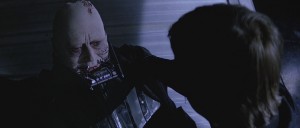 So in the end, Yoda harbored severe doubt in Luke’s abilities, and Kenobi harbored just enough faith to push Luke to the next level, but neither master was strong enough in the qualities that were needed to rekindle the full power of the Light of the Force.  Luke’s love for his father and his conviction (which he shared with his mother) that there was still good in Anakin is precisely what allowed Light to overcome the Dark Side in the end. That connection through Luke to Padme pulled Anakin back, allowing him to fulfill the prophecy of the Chosen One in the end. In Kenobi’s mind, the last shred of goodness Anakin had been burned away on Mustafar, and he’d never allow himself to see past the monster to the man. Faith requires a person to step beyond what’s visible and manifest in the world around you. The saga is nothing if not a master class in the power of faith vs. dogma and despair.
So in the end, Yoda harbored severe doubt in Luke’s abilities, and Kenobi harbored just enough faith to push Luke to the next level, but neither master was strong enough in the qualities that were needed to rekindle the full power of the Light of the Force.  Luke’s love for his father and his conviction (which he shared with his mother) that there was still good in Anakin is precisely what allowed Light to overcome the Dark Side in the end. That connection through Luke to Padme pulled Anakin back, allowing him to fulfill the prophecy of the Chosen One in the end. In Kenobi’s mind, the last shred of goodness Anakin had been burned away on Mustafar, and he’d never allow himself to see past the monster to the man. Faith requires a person to step beyond what’s visible and manifest in the world around you. The saga is nothing if not a master class in the power of faith vs. dogma and despair.
 I think there’s still plenty of room to expand on these themes in further episodes of Clone Wars, and clearly the production teams at Lucasfilm feel the same, otherwise there would be no season 6 in production. Again, we just hope we get to see it.  There are certainly still unanswered questions, such as the ultimate fates of Ahsoka, Captain Rex, and Asajj Ventress. Ahsoka I still feel will be around a while, and I can’t help but feel she has a place in the sequel trilogy. She left Mortis inundated with the Light Side of the Force, and that Light, combined with the shroud of the Dark Side that led to the Jedi Council betraying her, will push her into the larger galaxy to do amazing things. There’s a far larger story to tell yet. Captain Rex is currently the head of the 501st, but in ROTS, it’s Captain Appo leading the troops behind Anakin up the steps of the Temple. Rex’s loyalties to the Jedi might be in severe question between the ousting of Ahsoka and the events of the Umbara arc dealing with General Krell. Does he leave? Does he fight to the bitter end to save Anakin? We don’t yet know. Ventress is on a path that, were it not for the overarcing themes of redemption within the saga as a whole (Anakin, Han Solo), I would simply say her path as a bounty hunter will lead her into the Dark Times, and she’s spend the rest of her days making a living and perhaps meeting her end against the likes of Boba Fett. But because of that redemptive theme in the saga, and given that Anakin trusted her, I’m kind of wondering if her path will cross his or Ahsoka’s again. There’s a ton of story potential as yet left untapped. For the rest of the main players, the only story really left to tell, I think, is Kenobi trying to rebuild Anakin’s trust and having it be continually whittled away by his devotion to the Order. One step forward, two steps back, all the way to ROTS. The more they do this little dance, the stronger that movie becomes.
I think there’s still plenty of room to expand on these themes in further episodes of Clone Wars, and clearly the production teams at Lucasfilm feel the same, otherwise there would be no season 6 in production. Again, we just hope we get to see it.  There are certainly still unanswered questions, such as the ultimate fates of Ahsoka, Captain Rex, and Asajj Ventress. Ahsoka I still feel will be around a while, and I can’t help but feel she has a place in the sequel trilogy. She left Mortis inundated with the Light Side of the Force, and that Light, combined with the shroud of the Dark Side that led to the Jedi Council betraying her, will push her into the larger galaxy to do amazing things. There’s a far larger story to tell yet. Captain Rex is currently the head of the 501st, but in ROTS, it’s Captain Appo leading the troops behind Anakin up the steps of the Temple. Rex’s loyalties to the Jedi might be in severe question between the ousting of Ahsoka and the events of the Umbara arc dealing with General Krell. Does he leave? Does he fight to the bitter end to save Anakin? We don’t yet know. Ventress is on a path that, were it not for the overarcing themes of redemption within the saga as a whole (Anakin, Han Solo), I would simply say her path as a bounty hunter will lead her into the Dark Times, and she’s spend the rest of her days making a living and perhaps meeting her end against the likes of Boba Fett. But because of that redemptive theme in the saga, and given that Anakin trusted her, I’m kind of wondering if her path will cross his or Ahsoka’s again. There’s a ton of story potential as yet left untapped. For the rest of the main players, the only story really left to tell, I think, is Kenobi trying to rebuild Anakin’s trust and having it be continually whittled away by his devotion to the Order. One step forward, two steps back, all the way to ROTS. The more they do this little dance, the stronger that movie becomes.
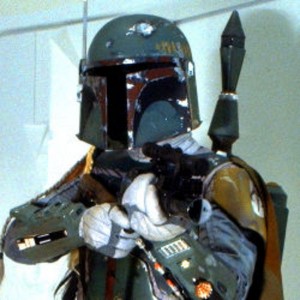 I brought up Boba Fett. I think his story up to ROTS is largely played out, depending upon where in the timeline he regains the Slave I from Hondo Ohnaka.  I truly feel his legend builds in the Dark Times, once he becomes a top agent for Vader to call upon. According to sources who worked on the original trilogy, Fett was built up in The Empire Strikes Back so as to be the big bad for Eps. VII-IX, with the final battle between Luke and Vader playing out in X-XII. Then it got whittled down to just 9 parts, so Fett would be a major player through at least Ep. VIII. Then it got whittled down to 6 parts, and as we saw, Fett went out like a punk. If they resurrect him a la the Expanded Universe, I think that would be a pointless cheat, but I’m not opposed to something far more grandiose than having him rescued by the likes of Dengar. I’m just not certain how they would reveal that in Ep. VII and not have it feel like a cheap soap opera move, so in my mind the legend of Fett is a misstep at this point, regardless of how cool he should have been. As much as I’d like to see this guy get another shot at greatness like Maul, I think the only golden opportunity to do that would be in the telling of the Dark Times era. People keep holding out hope for a live action series, but I think keeping the Clone Wars animated style is the way to go since we’re getting live action on the big screen. Keeps some consistency in the presentation that way. Either way, this era’s untapped screen potential is where Fett will have the most likely chance of redeeming himself.
I brought up Boba Fett. I think his story up to ROTS is largely played out, depending upon where in the timeline he regains the Slave I from Hondo Ohnaka.  I truly feel his legend builds in the Dark Times, once he becomes a top agent for Vader to call upon. According to sources who worked on the original trilogy, Fett was built up in The Empire Strikes Back so as to be the big bad for Eps. VII-IX, with the final battle between Luke and Vader playing out in X-XII. Then it got whittled down to just 9 parts, so Fett would be a major player through at least Ep. VIII. Then it got whittled down to 6 parts, and as we saw, Fett went out like a punk. If they resurrect him a la the Expanded Universe, I think that would be a pointless cheat, but I’m not opposed to something far more grandiose than having him rescued by the likes of Dengar. I’m just not certain how they would reveal that in Ep. VII and not have it feel like a cheap soap opera move, so in my mind the legend of Fett is a misstep at this point, regardless of how cool he should have been. As much as I’d like to see this guy get another shot at greatness like Maul, I think the only golden opportunity to do that would be in the telling of the Dark Times era. People keep holding out hope for a live action series, but I think keeping the Clone Wars animated style is the way to go since we’re getting live action on the big screen. Keeps some consistency in the presentation that way. Either way, this era’s untapped screen potential is where Fett will have the most likely chance of redeeming himself.
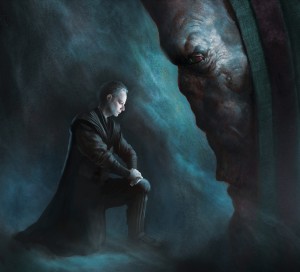 How best to link the two series? In the novel Darth Plagueis, we saw the events of The Phantom Menace played out from an alternative perspective that allowed us to see far more story than we did the first time through. Why couldn’t The Clone Wars and a potential Dark Times series be linked by doing the same for Revenge of the Sith?  The proposed Dark Times series I’d like to see would do just that, show us an alternate perspective of the events of ROTS. So whose perspective could we see? Just a thought here… Ahsoka Tano, Asajj Ventress, or even Boba Fett are all candidates at this point, depending on what Lucas had outlined for those rumored 50 hours of live action series that we’ll otherwise likely never see. Of the three, I think Ahsoka is the most logical choice given the popularity of the character and given that it’s largely through her eyes that we’ve enjoyed the last five seasons of The Clone Wars. Again, it would greatly depend on what’s been outlined for her character beyond what we’ve seen.
How best to link the two series? In the novel Darth Plagueis, we saw the events of The Phantom Menace played out from an alternative perspective that allowed us to see far more story than we did the first time through. Why couldn’t The Clone Wars and a potential Dark Times series be linked by doing the same for Revenge of the Sith?  The proposed Dark Times series I’d like to see would do just that, show us an alternate perspective of the events of ROTS. So whose perspective could we see? Just a thought here… Ahsoka Tano, Asajj Ventress, or even Boba Fett are all candidates at this point, depending on what Lucas had outlined for those rumored 50 hours of live action series that we’ll otherwise likely never see. Of the three, I think Ahsoka is the most logical choice given the popularity of the character and given that it’s largely through her eyes that we’ve enjoyed the last five seasons of The Clone Wars. Again, it would greatly depend on what’s been outlined for her character beyond what we’ve seen.
These are just my thoughts, and as such they are horrifically subjective. Maybe I’m reading too much into it. If you’ve read all this and have some of your own thoughts to share, I’d love to have them. This Sunday, the SciFiFX team is podcasting about The Clone Wars season 5, and some of this more expansive look will likely be brought up. If you’d like to be heard, you can leave a comment below, email us at podcast@scififx.com, or leave a voicemail at (313) 437-2434.

